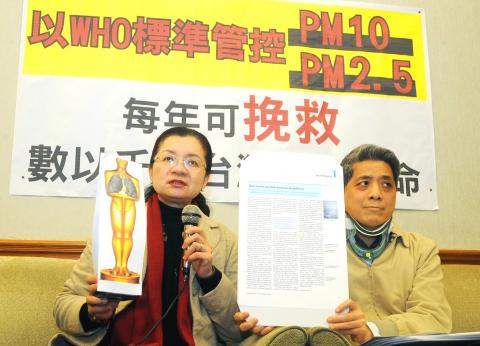|
Activists call for better air quality
By Lee I-chia / Staff Reporter

Democratic Progressive Party
Legislator Tien Chiu-chin, left, and Yeh Kuang-fan, a member of the Taiwan
Healthy Air Action Association and a gynecologist at Changhua Christian
Hospital, call on the government to follow WHO standards for regulating the
amount of fine particulate matter in the air, at a press conference in Taipei
yesterday.
Photo: Wang Yi-sung, Taipei Times
Doctors, legislators and environmentalists
yesterday said that in addition to fine particle PM2.5 (particles under 2.5
micrometers in diameter) air pollution, PM10 pollution can also harm the body
and they urged the government to raise regulations for the standards for both
types of pollutants to the level suggested by the WHO.
Quoting the latest issue of The Lancet, a weekly general medical journal, Yeh
Guang-peng (¸¥úË¢), a gynecologist at Changhua Christian Hospital, said new
research showed that coarse as well as fine particles smaller than PM2.5 could
enter the body, possibly through the nasal passage, and get into the brain.
Taiwan Neurological Society chairperson Wu Shey-lin (§Å¿üÀM) could not attend the
press conference, but expressed his opinions through a written document given to
reporters, saying that many reports in renowned medical journals have proved a
direct correlation between the air pollution index, strokes and dementia, so the
government should set stricter safety standards on PM2.5 and PM10 to protect
people¡¦s health.
Democratic Progressive Party Legislator Tien Chiu-chin (¥Ð¬îÔ») said data collected
by the Environmental Protection Administration (EPA) showed air quality in the
nation¡¦s five metropolitan areas all ranked below average when compared with
more than 1,000 cities globally ¡X with Greater Kaoshiung ranking No. 969 and
Taipei ranking No. 849.
Many people know that fine particle PM2.5 pollution is linked directly with
strokes, and cardiovascular and pulmonary diseases, but PM10 can also cause a
higher occurrence of cognitive decline, Yeh said. The loose safety standards on
PM10 pollution in Taiwan may mislead people and lead them to underestimate the
health risks associated with poor air quality.
A public hearing to discuss amending air quality standards is scheduled to take
place at the EPA tomorrow and formulating adequate standards for regulating
PM2.5 pollution is to be discussed during the meeting.
However, at present there are no regulations concerning concentrations of fine
particle PM2.5 pollution and the safety standard for particle PM10 pollution was
set at daily mean concentrations of 125£gg/m3 in 2004.
The WHO¡¦s suggested safety standard for PM2.5 pollution is a 20£gg/m3 annual mean
and a 50£gg/m3 daily mean concentration, while PM10 pollution is set at a 10£gg/m3
annual mean and a 25£gg/m3 daily mean concentration, Yeh said.
¡§Overseas medical reports suggest that even levels of air pollution deemed safe
by the WHO can contribute to higher rates of cognitive decline, strokes and
heart attacks,¡¨ Yeh said.
Responding to the press conference, Huang Wei-ming (¶À°¶»ï), a section chief at the
EPA¡¦s Air Quality Protection and Noise Control Department, said: ¡§Indeed, we
have not achieved the standard suggested by the WHO, but we hope to reach the
same levels as the US and Japan first and then take 10 years to gradually
achieve the WHO¡¦s standards.¡¨
¡§We hope the standard can be set at the WHO¡¦s suggested level straight away
because people¡¦s health is not something that can wait that long,¡¨ Tien said.
¡§The problem is much more serious than pesticide residue or lean-meat additives,
because people can choose not to eat certain food, but everyone has to inhale
the air.¡¨
|
![]()
![]()
![]()